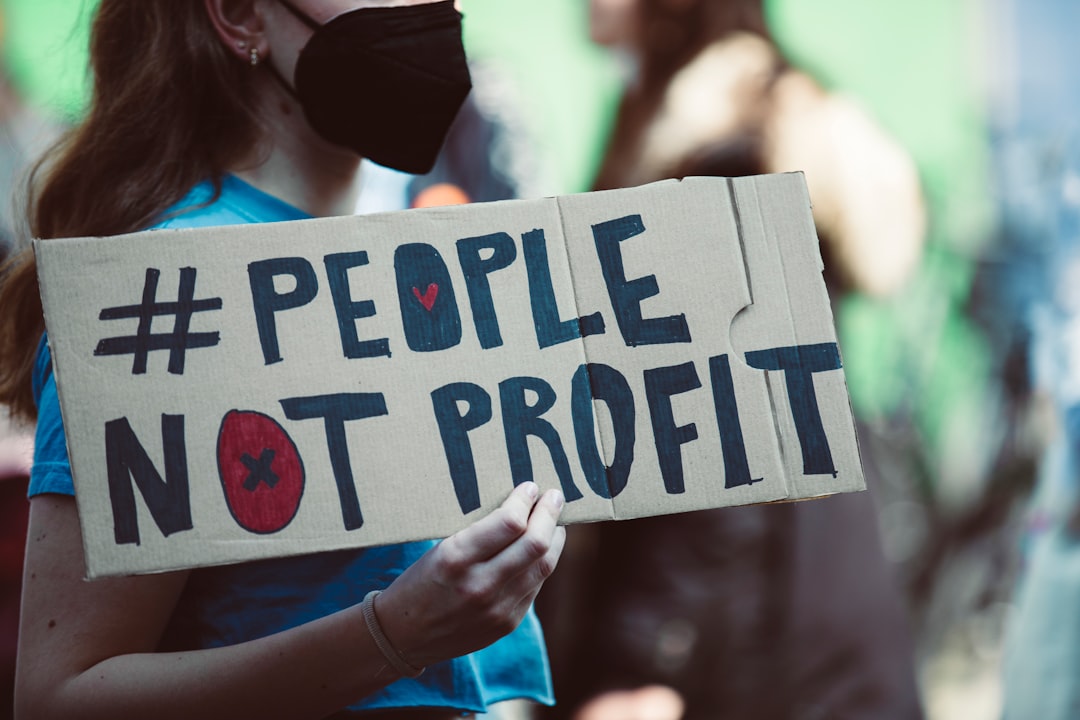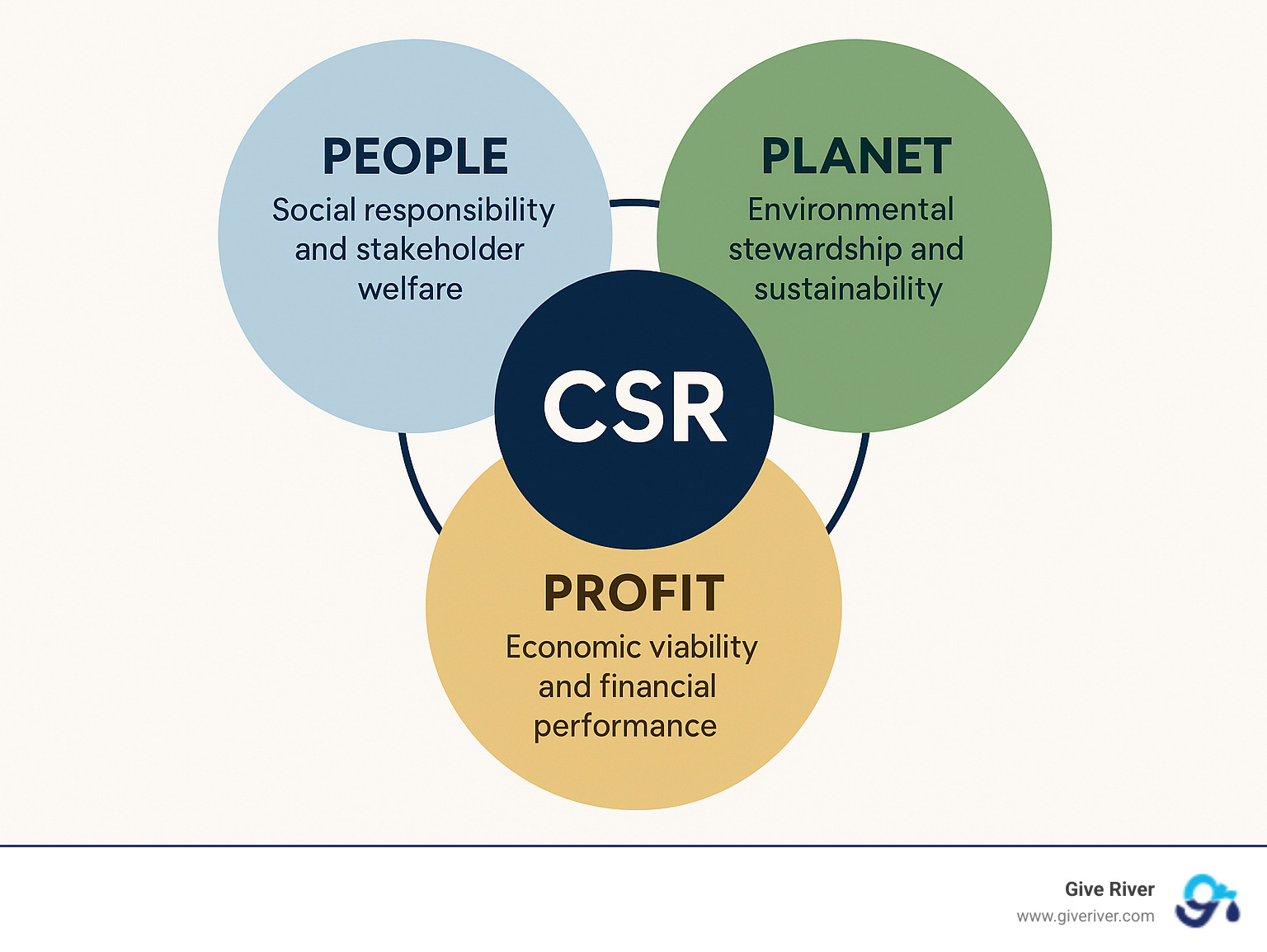Decoding CSR: What Corporate Social Responsibility Programs Really Mean
Unpack the true csr programme meaning. Explore its strategic value, stakeholder impact, and how to implement effective CSR programs.

More Than Just a Buzzword
The csr programme meaning centers on a business model where companies integrate social and environmental concerns into their operations. At its core, Corporate Social Responsibility is a strategic approach that balances three imperatives: people, planet, and profit.
Quick Answer: What Does CSR Programme Mean?
- Definition: Integrating social, environmental, and ethical concerns into business operations.
- Purpose: To create a positive societal impact while ensuring profitability.
- Components: Environmental, ethical, philanthropic, and economic responsibility.
- Goal: To balance the needs of all stakeholders, from employees to shareholders.
Why does this matter? Companies leading in environmental, social, and governance (ESG) matters enjoy an 11% valuation premium over competitors. Furthermore, nearly 60% of employees who are proud of their company's social responsibility are more engaged.
CSR is not just about charitable donations; it's a comprehensive business strategy that can transform your culture, boost engagement, and create measurable value. Successful programs show how purpose-driven practices drive both social impact and bottom-line results.
I'm Meghan Calhoun, and with two decades of experience building high-performance teams, I've seen how a true understanding of the csr programme meaning can revolutionize a workplace. Purposeful CSR initiatives are catalysts for deeper employee engagement and organizational success.

Simple guide to csr programme meaning terms:
The Strategic Value of CSR: Understanding the Full csr programme meaning
At Give River, we believe that grasping the full csr programme meaning is a game-changer for any organization. It’s about weaving social and environmental responsibility into the fabric of your business operations. This integrated approach is what makes leading companies stand out.
The Four Pillars: Key Types of CSR Activities
A comprehensive CSR strategy is built on four key pillars that contribute to a company's accountability and positive impact.
Environmental Responsibility: This focuses on minimizing a company's negative impact on the planet and actively contributing to sustainability. This includes reducing carbon emissions, managing waste, and supporting renewable energy. Patagonia is a leader in this area, famously dedicating 1% of its sales to environmental preservation and restoration.
Ethical and Human Rights Responsibility: This pillar is about operating with fairness and integrity. It means ensuring fair labor practices, safe workplaces, and championing diversity, equity, and inclusion (DEI). It extends to employees, suppliers, and customers. Unilever's Sustainable Living Plan, with its strong commitments to fair sourcing and human rights, is a prime example.
Philanthropic Responsibility: This involves actively improving society through donations, employee volunteering, and community support. It can take many forms, from financial grants to partnerships with non-profits. For example, General Motors has a history of granting millions to U.S. non-profits, investing directly in the communities where it operates.
Economic Responsibility: This pillar ensures a company's financial decisions align with doing good. While profitability is essential, it shouldn't come at the expense of people or the planet. This means making choices that support community development and fair wages, embodying the "Triple Bottom Line" of balancing economic, environmental, and social needs. Home Depot, for instance, plans to spend billions annually with diverse suppliers, showing a strong economic commitment.
Beyond Philanthropy: The Business Case for CSR
While the ethical drivers for CSR are strong, the business case is just as compelling. A robust csr programme meaning delivers tangible benefits across the organization.
- Improved Brand Reputation: Today's consumers are mindful of a company's social stance. A strong CSR profile boosts public perception and helps you stand out. Studies show 68% of global consumers would remain loyal to a brand that practices social responsibility.
- Increased Employee Engagement and Retention: People want to work for companies they believe in. Nearly 60% of employees proud of their company's social responsibility are more engaged and likely to stay, reducing turnover costs. Strong CSR also attracts top talent, especially from younger generations.
- Improved Investor Relations: Investors increasingly use Environmental, Social, and Governance (ESG) criteria to evaluate companies. ESG leaders enjoy an 11% valuation premium over competitors, as responsible practices are seen as indicators of long-term stability.
- Risk Mitigation: Proactive CSR initiatives help companies avoid public backlash, regulatory fines, and legal issues related to environmental or labor practices. By addressing these concerns early, companies protect their reputation and financial health.
- Operational Cost Savings: Sustainable practices like reducing energy use or waste often lead to significant efficiencies and lower operational costs, directly boosting the bottom line.
It's clear that the true csr programme meaning involves integrating these principles into your core business strategy for a lasting competitive edge.
A Deeper Look at the csr programme meaning for Stakeholders
The power of a csr programme meaning is felt across its entire network of stakeholders. A strong strategy recognizes that a company's success is tied to the well-being of everyone it impacts.

Stakeholder engagement is central to success. It's about building meaningful relationships and understanding the needs of each group:
- Employees: They are often your most passionate CSR champions. Providing opportunities for involvement, like volunteering, boosts engagement, purpose, and loyalty. Our 5G Method at Give River directly connects employees to community impact, enhancing their fulfillment.
- Customers: Today's consumers gravitate toward brands that align with their values. Transparency in your CSR efforts builds trust and loyalty, with many customers willing to pay more for products from sustainable companies.
- Communities: Companies are part of local communities and need a "social license to operate." Supporting local schools, sponsoring events, or providing resources builds strong, positive relationships and a supportive business environment.
- Suppliers and Partners: CSR extends throughout your supply chain. Ensuring partners adhere to ethical labor and environmental standards is vital for your own integrity and creates a positive ripple effect across your industry.
- Investors: Engaging with investors on your CSR initiatives demonstrates foresight and a commitment to long-term value, as they increasingly scrutinize ESG factors.
Measuring What Matters: Gauging Program Success
To know if your csr programme meaning is making a difference, you must measure its success and impact. This is crucial for accountability, improvement, and demonstrating value.
Companies can measure success by:
- Setting Key Performance Indicators (KPIs): Track metrics aligned with your goals, such as reductions in carbon emissions, water usage, or employee volunteer hours.
- Using Social Impact Metrics: Look at long-term outcomes. Frameworks like the UN Sustainable Development Goals (SDGs) offer a global blueprint for tracking progress on major issues like poverty, education, and climate action.
- Conducting Employee Engagement Surveys: Regularly survey employees to gauge their awareness, participation, and pride in the company's social responsibility initiatives.
- Tracking Brand Perception: Monitor media mentions, social media sentiment, and consumer surveys to see how CSR efforts influence public opinion and brand trust.
- Reporting with Transparency: Create clear, comprehensive reports for stakeholders using frameworks like the Global Reporting Initiative (GRI). This builds trust and allows for external verification.
- Seeking Third-Party Verification: Certifications like B Corp or an EcoVadis Scorecard add credibility and assure stakeholders that your CSR efforts are genuine and effective.
Implementing CSR: A Practical Guide to the csr programme meaning in Action
Bringing a csr programme meaning to life requires careful planning and consistent effort. While often associated with large corporations, CSR is just as vital for small and medium-sized enterprises (SMEs).
How can SMEs effectively implement CSR?
- Start small and local: Begin with manageable initiatives that connect to your community, like supporting a local charity or starting a recycling program.
- Integrate into your core business: Weave CSR into daily operations. A local bakery might source organic ingredients, or a tech firm could offer pro bono services.
- Leverage employee passion: Involve your team in choosing and leading initiatives to build ownership and boost morale.
What are the key challenges when implementing a CSR strategy?
- Gaining leadership buy-in: Top-level support is essential. If it's lacking, build a business case highlighting the benefits.
- Resource allocation: CSR requires an investment of time, money, and people. A dedicated budget and staff are necessary.
- Integration vs. isolation: Avoid treating CSR as a separate function. It must be integrated into the core business strategy for maximum impact.
- Avoiding greenwashing: Ensure your efforts are genuine and backed by verifiable impact to build real trust.
At Give River, our 5G Method is designed to weave social impact directly into employee engagement, making CSR an intuitive part of your culture. While traditional recognition platforms like Bonusly or Kudos are effective for peer-to-peer praise, they often operate separately from a company's social responsibility goals. Give River bridges this gap. By empowering employees to contribute to causes they care about as part of the recognition process, we offer a deeper, more integrated community impact that makes CSR personal and fulfilling.
Building a Culture of Impact and Fulfillment
Understanding the true csr programme meaning is about creating a workplace where people feel connected to something bigger than themselves. It's a powerful business strategy that weaves together environmental, ethical, philanthropic, and economic responsibility to balance people, planet, and profit.
The evidence is clear: an 11% valuation premium for ESG leaders and nearly 60% higher engagement for employees proud of their company's social impact. This is the intersection of business success and human fulfillment.

Effective CSR requires thoughtful stakeholder engagement and clear measurement to ensure real change. However, many organizations struggle to connect their CSR strategy to the daily employee experience. While platforms like Bonusly and Kudos are great for peer recognition, they often miss the link between personal fulfillment and community impact. This is where Give River's 5G Method shines. Unlike platforms focused solely on recognition, Give River integrates charitable impact directly into the employee experience. Through gamification and community impact tools, employees don't just participate in social responsibility—they help shape it. By contributing to causes they care about, they express their values through their work.
The future belongs to organizations where the csr programme meaning translates into daily experiences of impact and fulfillment. Ready to transform how your team experiences social responsibility? Our approach to charitable impact builds a legacy that goes far beyond quarterly reports.
Find out how more info about charitable impact solutions can help you build a culture of purpose.


